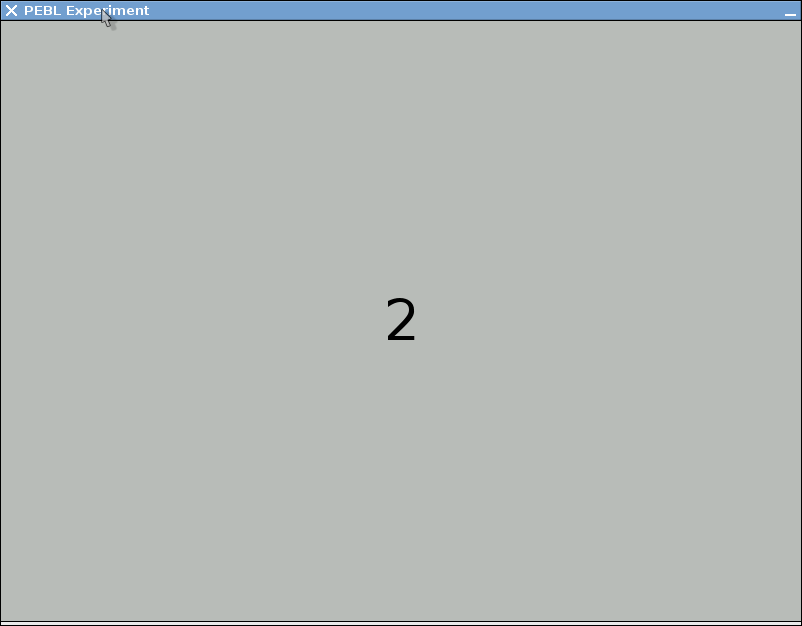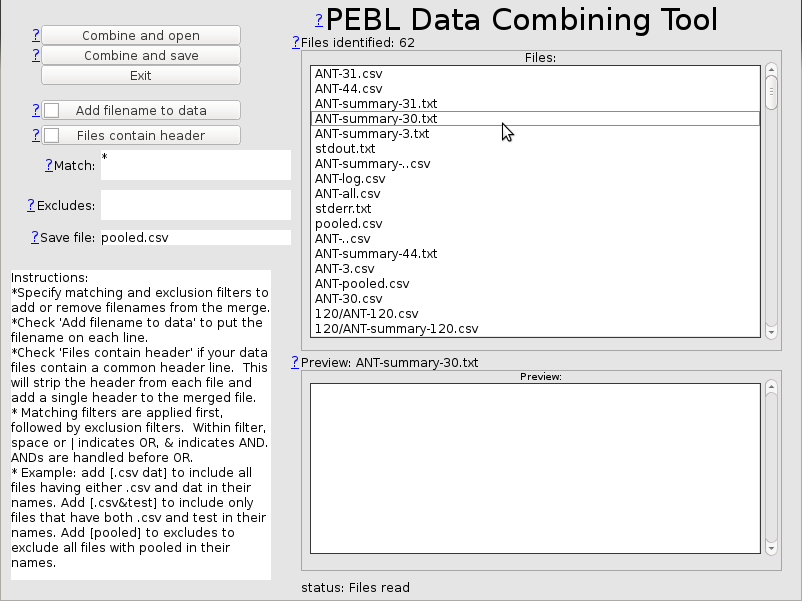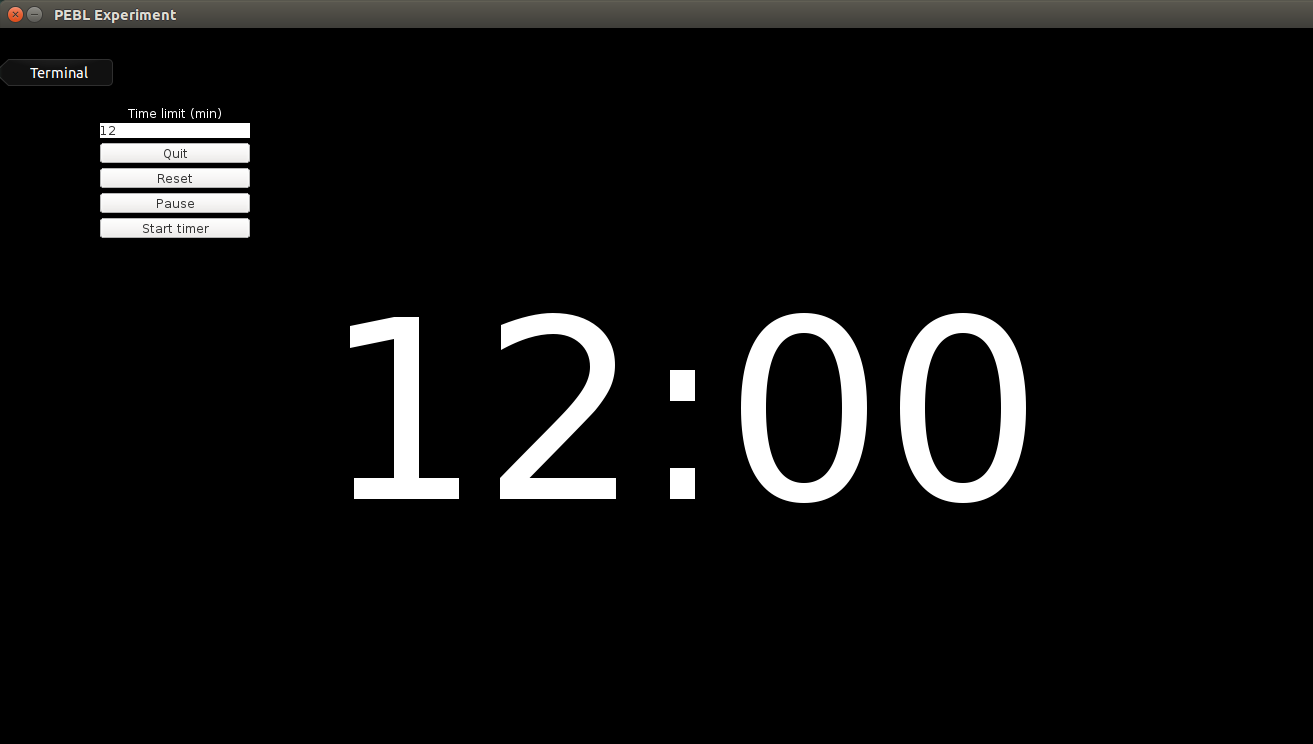 In PEBL 0.14, we've included a free "Big-five" personality scale. The test involves 50 questions that are responded to on five-point scale, and measure the five most common dimensions of personality: introversion/extroversion, agreeableness, conscientiousness, emotionality, and intellectualism. The scale was originally developed by Goldberg (1992) and is available as art of the many resources at http://ipip.ori.org
In PEBL 0.14, we've included a free "Big-five" personality scale. The test involves 50 questions that are responded to on five-point scale, and measure the five most common dimensions of personality: introversion/extroversion, agreeableness, conscientiousness, emotionality, and intellectualism. The scale was originally developed by Goldberg (1992) and is available as art of the many resources at http://ipip.ori.orgPEBL Blog
Monday, August 18, 2014
Testing personality with PEBL
 In PEBL 0.14, we've included a free "Big-five" personality scale. The test involves 50 questions that are responded to on five-point scale, and measure the five most common dimensions of personality: introversion/extroversion, agreeableness, conscientiousness, emotionality, and intellectualism. The scale was originally developed by Goldberg (1992) and is available as art of the many resources at http://ipip.ori.org
In PEBL 0.14, we've included a free "Big-five" personality scale. The test involves 50 questions that are responded to on five-point scale, and measure the five most common dimensions of personality: introversion/extroversion, agreeableness, conscientiousness, emotionality, and intellectualism. The scale was originally developed by Goldberg (1992) and is available as art of the many resources at http://ipip.ori.orgSunday, July 27, 2014
RATs! A way to measure creative thinking
One of the new tasks included in PEBL 0.14 is an implementation of the Remote Associates Task (RAT). A RAT is not a creepy vermin with a tail; rather it is a word puzzle in which you are given three words that are not really related to one another, but they are all related to a third word. This can be either linguistically-related (phone, match, play are all words that precede 'book'), or more meaning-related (stick, light, cake all relate to candle). The screenshot shows how the PEBL version is arranged. The red bar is a timer that shrinks; you have 30 seconds to identify and type the answer.
Monday, July 21, 2014
A Simple Free Open-source conference presentation timer
Although PEBL is designed for creating and sharing psychological tests, I've used it to make a handful of little graphical utilities for other purposes. This includes the launcher, and the data combining tool, and other things. I recently held a conference and needed a way to alert speakers about the time left, along with sort of warnings that they are running out of time. I created a simple presentation timer in PEBL for this purpose. I ended up making some tweaks mid-conference to improve usability, but I thought I'd make it available for anyone. It requires 0.14 because of its use of certain buttons.
Thursday, July 17, 2014
Setting up different parameter sets: Example with forward and backward digit span.
 The new parameter setting feature in the PEBL launcher let's you control many aspects about the tasks in the battery without doing any programming. This will typically let you alter aspects of the design, timing, and number of trials of a test to fit your experiment. For some tests, a parameter lets you decide which version of the test to use. This includes the digit span and corsi blocks (decide whether to test forward or backward), the tower of london and tower of hanoi (specifying which problem set to use), and many others.
The new parameter setting feature in the PEBL launcher let's you control many aspects about the tasks in the battery without doing any programming. This will typically let you alter aspects of the design, timing, and number of trials of a test to fit your experiment. For some tests, a parameter lets you decide which version of the test to use. This includes the digit span and corsi blocks (decide whether to test forward or backward), the tower of london and tower of hanoi (specifying which problem set to use), and many others.Tuesday, July 8, 2014
Overview of some of the new tests in the PEBL Test Battery 0.14
Note that some of the links below to the PEBL wiki are incomplete. If you'd like to make help write this documentation, I provide the password to bypass the PEBL nag screen to anyone who will do so.
Thursday, June 26, 2014
A Simple Data File Combiner
 As part of PEBL 0.14,we offer a simple tool to help you combine data from multiple files into a single file.
As part of PEBL 0.14,we offer a simple tool to help you combine data from multiple files into a single file.Starting in 0.14, we use a data saving scheme and set of functions that help improve organization and prevent overwriting. Within each battery folder, a data\ folder is created. Within each data folder, a subject code folder is created, and one or more files saving data are created for each participant in that subfolder. For some experiments, a master pooled data file will also be created, but not for all.
Tuesday, June 24, 2014
Announcing: PEBL Version 0.14
After a record-setting PEBL 0.13 (with more than 26,000 downloads), I'm excited to release the newest version of PEBL; version 0.14!
Complete release notes are available at The PEBL Wiki. This version contains many new improvements, but highlights are listed after the jump.
I'm initially releasing two version for windows. One installation package (which requires administrator access, but PEBL shows up in your menu and creates a battery folder in Documents\pebl-0.14.exp), and another 'standalone' version that could be run off of a usb drive or on a computer which you cannot install software on.
Complete release notes are available at The PEBL Wiki. This version contains many new improvements, but highlights are listed after the jump.
I'm initially releasing two version for windows. One installation package (which requires administrator access, but PEBL shows up in your menu and creates a battery folder in Documents\pebl-0.14.exp), and another 'standalone' version that could be run off of a usb drive or on a computer which you cannot install software on.
Friday, May 23, 2014
A nonverbal stroop test for children to examine the bilingual advantage
Over the past several years, I have collaborated with Alena Esposito (who was a student at NCSU at the time) developing some PEBL tests that help measure the impact of executive control and suppression of irrelevant information on bilingual children. This project already spurred the development of two new stroop tests that are part of PEBL (a standard color stroop and a number stroop), but it also lead to development of a new test, the Bivalent Shape Task (BST), which was published in a paper in Cognitive Development (fulltext), and we just got published as a meta-paper in the Journal of Open Research Software (JORS).
Tuesday, April 1, 2014
A study of executive function in children
Ivan Ropovik just published a study in Intelligence looking at executive function in children. He used a number of PEBL tests, as well as several non-PEBL versions of tests for which PEBL has implementations, to look at the factor structure of executive control in children. One of their basic covariance (structural equation) model of the data is shown on the left.
Tuesday, March 18, 2014
Running PEBL without installing
Currently, versions of PEBL running on Windows require that you install the software into your c:\Program Files\ directory. This is inconvenient for some folks, as you must have administrator access. PEBL doesn't really require that you install in order to run, but by doing so you can do things like launching from the menu and letting all users on a computer access PEBL.
If you are having trouble installing, try downloading the stand-alone version here:
http://sourceforge.net/projects/pebl/files/pebl/0.13/pebl_0.13_noinstall.zip/download
This will download a .zip file. Put it wherever you want (i.e., the desktop), and then right click and select 'Extract All...' to unzip it (there are other ways to do this too, so use whatever you are comfortable with).
If you are having trouble installing, try downloading the stand-alone version here:
http://sourceforge.net/projects/pebl/files/pebl/0.13/pebl_0.13_noinstall.zip/download
This will download a .zip file. Put it wherever you want (i.e., the desktop), and then right click and select 'Extract All...' to unzip it (there are other ways to do this too, so use whatever you are comfortable with).
Friday, February 21, 2014
Installing PEBL 0.13 on Mac OSX 10.9 (UPDATE)
UPDATE:
Since this was posted, I have figured out the problems with PEBL on OSX and uploaded a new fix. This new fix will work on OSX 10.7 and newer. Here is a screencast for the new version, the older screencast is still available for users of OSX 10.6, and those who want to install the BST.
Since this was posted, I have figured out the problems with PEBL on OSX and uploaded a new fix. This new fix will work on OSX 10.7 and newer. Here is a screencast for the new version, the older screencast is still available for users of OSX 10.6, and those who want to install the BST.
Wednesday, January 22, 2014
Paper in Journal of Neuropsychological Methods: PEBL and the PEBL Test Battery
I just published a paper with Brian Piper called The Psychology Experiment Building Language (PEBL) and PEBL Test Battery (see here for paper)
that provides the most comprehensive description of PEBL to date. Above I show an (updated) figure from that paper showing the overall growth in PEBL usage over time. The final tally for 2013 was about 17000 downloads of the pebl installer (22,000 downloads total including other files like manuals), and about 55 published manuscripts, theses, conference papers, etc. that I know of.
Tuesday, November 26, 2013
Recent research on executive function and driving
 |
| Conceptual model of individual differences in Executive function. source |
Sunday, November 24, 2013
That is so random: The PEBL Random Generation Task
Human random number generation has been studied for many years, maybe most famously by Alan Baddeley in his exploration of the central executive, and Akira Miyake in a later study of executive function. Tasks such as this have been around a lot longer, and Towse and Neil (1998) published a lot of nice metrics of randomness that can be used to assess the quality of randomness of a sequence.
To implement a PEBL version of this, I modeled the version described in Miyake's paper, and implemented many of Towse and Niel's randomness measures to provide an automatic report.
To implement a PEBL version of this, I modeled the version described in Miyake's paper, and implemented many of Towse and Niel's randomness measures to provide an automatic report.
Sunday, August 25, 2013
Measuring Attention with the Kinect---and PEBL

Darren Stanley just completed his Master's thesis at RIT called "Measuring attention using the Microsoft Kinect"; the degree was in computer science. The research is actually similar to another recent study by Qiu and Helbig (2012), that used more complicated motion capture setups, and used some PEBL tests for validation.
The study used three of PEBL's attention/vigilance tasks, the TOAV, the pCPT, and the PPVT to measure and induce an attention task set on 20 participants. They simultaneously measured behavioral signatures related to posture and facial gestures, gaze, audio, and some other things. Then, they used regression analyses to determine which features predicted behavioral aspects of flagging attention (such as RT).
Subscribe to:
Posts (Atom)







